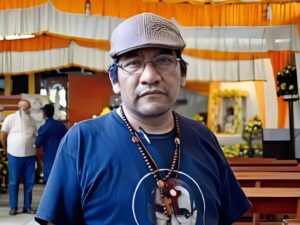No mas! The assassination of Father Marcelo in Chiapas requires an urgent response from the Mexican government

The call for attention to the increasing violence experienced in Chiapas, Mexico
“We have to redouble our efforts to build, from hope, against all hope, paths of peace and justice, from resistance – resilience, from creative non-violence.” – Anonymous advocate.
KAIROS decries the assassination of Fr. Marcelo Pérez Pérez, a Tsotsil Jesuit priest and human rights advocate. He was killed on October 20, shortly after celebrating Mass in San Cristóbal de las Casas. He is one more victim of the violence in the State of Chiapas, Mexico, especially in the regions where the main cartels – Sinaloa and Jalisco Nueva Generación -are fighting to control.
Father Marcelo, an Indigenous Tzotzil, had long been a vocal critic of cartel violence and a defender of Indigenous rights. A member of the Archdiocese of Saint Cristobal de las Casas, Father Marcelo mediated conflicts, spoke out against human trafficking and resource exploitation and worked tirelessly for peace in his community.
His assassination, which is the latest in a series of violent attacks in Chiapas, underscores the dangers faced by those who oppose criminal organizations. The Diocese of San Cristobal de las Casas in Chiapas and the Center of Indigenous Peace Mediators have been active KAIROS partners for over 15 years.
KAIROS has supported the Centre in its work to train and strengthen human rights promoters, particularly those who are Indigenous, to work across the diocese to defend human rights for those at the intersection of Indigenous rights and ecological justice. The program is rooted in the historic work of the Diocese of San Cristobal in human rights and social justice and is associated with the legacy of Bishop Samuel Ruiz.
Chiapas has long been a hub for organized crime due to its strategic position near the Guatemalan border, which facilitates drug and human trafficking. Rival cartels, such as the Jalisco New Generation Cartel (CJNG) and others, have been involved in brutal territorial conflicts, leading to widespread violence, kidnappings, and internal displacement of Indigenous populations.
The situation in Chiapas highlights the complex and tragic interplay between drug cartel violence, organized crime impunity, lack of responsible government intervention, and the vulnerability of Indigenous and peasant communities caught in the crossfire of these conflicts.
Father Marcelo’s murder has sent shockwaves through both the religious and Indigenous communities, as he was beloved for his dedication to peace and justice. Despite ongoing threats, he remained committed to his mission of protecting the marginalized Indigenous communities and voicing their calls for autonomy, respect and protection against the organized crime gangs.
His death has raised calls for accountability and action from the Mexican government at all levels to address the root causes of violence in the region. Unfortunately, impunity remains rampant, with the Mexican state struggling to contain the power of cartels in regions like Chiapas, where Indigenous communities are often left defenceless amid the violence.
Leaders, including outgoing Governor Rutilio Escandón, have promised that the crime against Father Marcelo will not go unpunished, but the lack of justice in previous cases leaves many skeptical. Religious groups, especially the Jesuits, have emphasized that these murders are not isolated incidents but part of a broader systemic issue that requires urgent government intervention.
Father Marcelo’s assassination is a grim reminder of the ongoing struggles in the region and the need for comprehensive solutions to address the marginalization and violence against Indigenous peoples.
On October 21, the Diocese of San Cristobal de las Casas in Chiapas issued this letter in response to the assignation of Fr. Marcelo Pérez Pérez. The letter is available in the original Spanish and English translation.
Below is a video from the Mexican Episcopal Conference.
